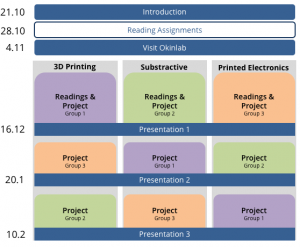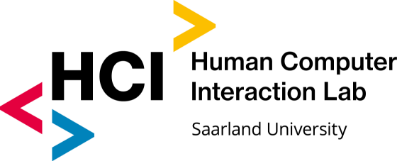Seminar: Interactive Digital Fabrication in cooperation with Okinlab
For 3rd year B.Sc. Students and for M.Sc. Students
Instructors: Dr. Jürgen Steimle, Daniel Gröger, Martin Weigel
Description
A revolution is in the making. New digital fabrication tools enable laypeople to produce physical objects quickly and in high quality. A variety of widely accessible fabrication tools, such as 3D printers and laser cutters can physically realize a digital design. This enables people to realize highly personalized objects, replacement parts, clothing, accessories, and furniture. In addition to passive shapes, recent advances in digital fabrication now even allow for printing of functioning electronic devices.
This “digitization” of production makes personalized production widely accessible: instead of requiring expert skills in a specific physical domain, people can now fabricate their own objects largely by interacting with standard software. This puts Human-Computer Interaction into the center of fabrication, as the software user interface defines what people can fabricate and how quickly and easily they can do so.
The goal of this seminar is to familiarize the participants with digital fabrication, its tools and techniques, and the novel opportunities it opens up. The seminar will consist of a productive mixture of introductory lectures, reading assignments, and a practical group project. It will cover fundamentals, the latest advances in digital fabrication, and provide a hands-on experience with digital fabrication tools in a variety of application domains.
The seminar will be organized in cooperation with Okinlab. Okinlab is a local award-winning start-up that leverages digital fabrication for creating personalized furniture.
|
‘ |

|
The class will cover the following topics:
- Overview of digital fabrication
- FabLabs and the maker movement
- Tools and approaches for interactive digital modeling
- Physical fabrication tools: additive vs. subtractive processes, 3D printing, laser cutting
- Digital fabrication of electronic devices: printing customized flexible sensors, displays and actuators
- Latest advances in research on digital fabrication
- Applications of digital fabrication: personalized objects, personalized furniture, wearable computing, interactive objects
Dates
— Prior registration is mandatory, see below. —
Introductory session on Wednesday, 21.10.15 at 14:00 in Bld. E1.7, room 0.08.
Weekly sessions during the semester (class period) on Wednesdays from 14:00 – 15:30 in Bld. E1.7, room 0.08.
Agenda

Requirements
- Interest in building, making, crafting
- Interest in interactive devices
- Solid programming skills
- Previous classes on Human-Computer Interaction are a plus, but not required
How to apply
Given space restrictions in the FabLab, we can accept only a maximum of 15 participants. Please apply with a brief statement what is your motivation in attending this seminar and details on your programming experience, including what project(s) you have already implemented. Please indicate what is your study program, your semester of study as well as what classes you have already taken in the field of Human-Computer Interaction. If you would like to team up with a specific student, please indicate the person(s) name(s).
Literature
- Gershenfeld, N.: Fab: The Coming Revolution on Your Desktop–from Personal Computers to Personal Fabrication, Basic Books, Inc., 2007
- Steimle, J.: Printed Electronics for Human-computer Interaction, interactions, ACM, 2015, 22, 72-75 http://doi.acm.org/10.1145/2754304
3D Printing
- Karl Willis, Eric Brockmeyer, Scott Hudson, and Ivan Poupyrev. 2012. Printed optics: 3D printing of embedded optical elements for interactive devices. In Proceedings of the 25th annual ACM symposium on User interface software and technology (UIST ’12). ACM, New York, NY, USA, 589-598. DOI=http://dx.doi.org/10.1145/2380116.2380190
- Gierad Laput, Eric Brockmeyer, Scott E. Hudson, and Chris Harrison. 2015. Acoustruments: Passive, Acoustically-Driven, Interactive Controls for Handheld Devices. In Proceedings of the 33rd Annual ACM Conference on Human Factors in Computing Systems (CHI ’15). ACM, New York, NY, USA, 2161-2170. DOI=http://dx.doi.org/10.1145/2702123.2702414
- Martin Schmitz, Mohammadreza Khalilbeigi, Matthias Balwierz, Roman Lissermann, Max Mühlhäuser, Jürgen Steimle. Capricate: A Fabrication Pipeline to Design and 3D Print Capacitive Touch Sensors for Interactive Objects. In Proceedings of the 28th annual ACM symposium on User interface software and technology (to appear). URL=https://www.tk.informatik.tu-darmstadt.de/en/research/tangible-interaction/capricate/
- Stefanie Mueller, Sangha Im, Serafima Gurevich, Alexander Teibrich, Lisa Pfisterer, François Guimbretière, and Patrick Baudisch. 2014. WirePrint: 3D printed previews for fast prototyping. In Proceedings of the 27th annual ACM symposium on User interface software and technology (UIST ’14). ACM, New York, NY, USA, 273-280. DOI=http://dx.doi.org/10.1145/2642918.2647359
Substractive
- Stefanie Mueller, Bastian Kruck, and Patrick Baudisch. 2013. LaserOrigami: laser-cutting 3D objects. In Proceedings of the SIGCHI Conference on Human Factors in Computing Systems (CHI ’13). ACM, New York, NY, USA, 2585-2592. DOI=http://dx.doi.org/10.1145/2470654.2481358
- Stefanie Mueller, Pedro Lopes, Konstantin Kaefer, Bastian Kruck, and Patrick Baudisch. 2013. constructable: interactive construction of functional mechanical devices. In ACM SIGGRAPH 2013 Talks (SIGGRAPH ’13). ACM, New York, NY, USA, , Article 39 , 1 pages. DOI=http://dx.doi.org/10.1145/2504459.2504508
- Lu, T., Finkenauer, L., Wissman, J., and Majidi, C. Rapid Prototyping for Soft-Matter Electronics. Advanced Functional Materials, (2014). DOI=http://onlinelibrary.wiley.com/doi/10.1002/adfm.201303732/abstract
- Stelian Coros, Bernhard Thomaszewski, Gioacchino Noris, Shinjiro Sueda, Moira Forberg, Robert W. Sumner, Wojciech Matusik, and Bernd Bickel. 2013. Computational design of mechanical characters. ACM Trans. Graph. 32, 4, Article 83 (July 2013), 12 pages. DOI=http://dx.doi.org/10.1145/2461912.2461953
Printed Electronics
- Yoshihiro Kawahara, Steve Hodges, Benjamin S. Cook, Cheng Zhang, and Gregory D. Abowd. 2013. Instant inkjet circuits: lab-based inkjet printing to support rapid prototyping of UbiComp devices. In Proceedings of the 2013 ACM international joint conference on Pervasive and ubiquitous computing (UbiComp ’13). ACM, New York, NY, USA, 363-372. DOI=10.1145/2493432.2493486 http://doi.acm.org/10.1145/2493432.2493486
- Simon Olberding, Nan-Wei Gong, John Tiab, Joseph A. Paradiso, and Jürgen Steimle. 2013. A cuttable multi-touch sensor. In Proceedings of the 26th annual ACM symposium on User interface software and technology (UIST ’13). ACM, New York, NY, USA, 245-254. DOI=http://dx.doi.org/10.1145/2501988.2502048
- Simon Olberding, Michael Wessely, and Jürgen Steimle. 2014. PrintScreen: fabricating highly customizable thin-film touch-displays. In Proceedings of the 27th annual ACM symposium on User interface software and technology (UIST ’14). ACM, New York, NY, USA, 281-290. DOI=http://dx.doi.org/10.1145/2642918.2647413
- Simon Olberding, Sergio Soto Ortega, Klaus Hildebrandt and Jürgen Steimle. Foldio: Digital Fabrication of Interactive and Shape-Changing Objects With Foldable Printed Electronics. In Proceedings of UIST’15 (to appear). URL=https://hci.cs.uni-saarland.de/research/foldio/
Language: English
Credit Points: 7CP
Maximum number of participants: 15
Contact: embodied-teaching@mpi-inf.mpg.de
Materials
Slides and other seminar materials are available here: Seminar materials


